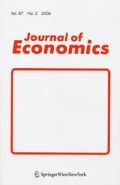References
G. C. Archibald and D. Donaldson (1979): Notes on Economic Equality, Journal of Public Economics12, pp. 205–214.
K. Arrow (1951, 1963): Social Choice and Individual Values, New York: Wiley.
A. Camacho (forthcoming): A Model of Societies and Social Decision Functions.
T. Daniel (1975): A Revised Concept of Distributional Equity, Journal of Economic Theory11, pp. 94–109.
A. Feldman and A. Kirman (1974): Fairness and Envy, American Economic Review64, pp. 995–1005.
D. K. Foley (1967): Resource Allocation in the Public Sector, Yale Economic Essays7, pp. 73–76.
D. Friedman (1980): Many, Few, One: Social Harmony and the Shrunken Choice Set, American Economic Review70, pp. 225–232.
S. M. Goldman and C. Sussangkarn (1978): On the Concept of Fairness, Journal of Economic Theory19, pp. 210–216.
J. Harsanyi (1975): Can the Maximin Principle Serve as a Basis for Morality? A Critique of John Rawls' Theory, American Political Science Review69, pp. 588–593.
P. Hammond (1976): Why Ethical Measures of Inequality Need Interpersonal Comparisons, Theory and Decision7, pp. 262–274.
M. Kemp and Y.-K. Ng (1976): On the Existence of Social Welfare Functions, Social Orderings and Social Decision Functions, Economica43, pp. 59–66.
M. Kemp and Y.-K. Ng (1977): More on Social Welfare Functions: The Incompatibility of Individualism and Ordinalism, Economica44, pp. 89–90.
M. Kemp and Y.-K. Ng (1982): The Incompatibility of Individualism and Ordinalism, Mathematical Social Sciences3.
S. C. Kolm (1972): Justice and Equite, Paris: Editions du Centre National de la Recherche Scientifique.
I. Little (1952): Social Choice and Individual Values, Journal of Political Economy60, pp. 422–432.
J. Mirrlees (1971): An Exploration in the Theory of Optimum Income Taxation, Review of Economic Studies38, pp. 175–208.
J. Mirrlees (forthcoming): The Theory of Optimal Taxation, in: K. Arrow and M. Intriligator (eds.): Handbook of Mathematical Economics, Vol. III, Amsterdam.
E. Mishan (1965): The Recent Debate on Welfare Criteria, Oxford Economic Papers17, pp. 219–236.
E. Mishan (1969): Welfare Economics: An Assessment, Amsterdam.
E. Mishan (1973): Welfare Criteria: Resolution of a Paradox, Economic Journal83, pp. 747–767.
E. Mishan (1976): The New Welfare Criteria and the Social Welfare Function, Economisch en Sociaal Tijdschrift5, pp. 775–783.
E. Mishan (1980): The New Welfare Economics. An Alternative View, International Economic Review21, pp. 691–705.
D. Mueller (1979): Public Choice, Cambridge.
Y.-K. Ng (1971): The Possibility of a Paretian Liberal: Impossibility Theorems and Cardinal Utility, Journal of Political Economy79, pp. 1397–1402.
Y.-K. Ng (1972): Value Judgements and Economist's Role in Policy Recommendation, Economic Journal82, pp. 1014–1018.
Y.-K. Ng (1975): Bentham or Bergson? Finite Sensibility, Utility Functions, and Social Welfare Functions, Review of Economic Studies42, pp. 545–570.
Y.-K. Ng (1979): Welfare Economics: Introduction and Development of Basic Concepts, London.
Y.-K. Ng (1981): Welfarism: A Defence Against Sen's Attack, Economic Journal91, pp. 527–530.
Y.-K. Ng (1982): Interpersonal Level Comparability Implies Comparability of Utility Differences, Mimeo, Clayton.
R. Parks (1976): An Impossibility Theorem for Fixed Preferences: A Dictatorial Bergson-Samuelson Welfare Function, Review of Economic Studies43, pp. 447–450.
E. Pazner (1977): Pitfalls in the Theory of Fairness, Journal of Economic Theory14, pp. 458–466.
E. Pazner and D. Schmeidler (1974): A Difficulty in the Concept of Fairness, Review of Economic Studies41, pp. 441–443.
E. Pazner and D. Schmeidler (1978 a): Decentralization and Income Distribution in Socialist Economics, Economic Inquiry16, pp. 257–264.
E. Pazner and D. Schmeidler (1978 b): Egalitarian Equivalent Allocations: A New Concept of Economic Equity, Quarterly Journal of Economics92, pp. 671–687.
R. Pollak (1979): Bergson-Samuelson Social Welfare Functions and the Theory of Social Choice, Quarterly Journal of Economics93, pp. 73–90.
L. Robbins (1932): An Essay on the Nature and Significance of Economic Science, London.
L. Robbins (1938): Interpersonal Comparison of Utility: A Comment, Economic Journal48, pp. 635–641.
K. Roberts (1980 a): Possibility Theorems With Interpersonally Comparable Welfare Levels, Review of Economic Studies47, pp. 409–420.
K. Roberts (1980 b): Interpersonal Comparability and Social Choice Theory, Review of Economic Studies47, pp. 421–439.
K. Roberts (1980 c): Social Choice Theory: The Single-Profile and Multi-Profile Approaches, Review of Economic Studies47, pp. 441–450.
P. A. Samuelson (1967): Arrow's Mathematical Politics, in: S. Hook (ed.): Human Values and Economic Policy: A Symposium, New York, pp. 41–51.
D. Schmeidler and K. Vind (1972): Fair Net Trades, Econometrica40, pp. 637–642.
A. Sen (1970): The Impossibility of a Paretian Liberal, Journal of Political Economy78, pp. 152–157.
A. Sen (1973): On Economic Inequality, Oxford.
A. Sen (1976): Liberty, Unanimity and Rights, Economica43, pp. 217–245.
A. Sen (1979): Personal Utilities and Public Judgements, or What's Wrong With Welfare Economics?, Economic Journal89, pp. 537–558.
K. Suzumura (1981 a): On the Possibility of “Fair” Collective Choice Rule, International Economic Review22, pp. 351–364.
K. Suzumura (1981 b): On Pareto-Efficiency and the No-Envy Concept of Equity, Journal of Economic Theory25, pp. 367–379.
H. Varian (1974): Equity, Envy and Efficiency, Journal of Economic Theory9, pp. 63–91.
H. Varian (1975): Distributive Justice, Welfare Economics, and the Theory of Fairness, Philosophy and Public Affairs4, pp. 223–247.
H. Varian (1976): Two Problems in the Theory of Fairness, Journal of Public Economics5, pp. 249–260.
Author information
Authors and Affiliations
Additional information
For helpful comments, I am grateful to A. Camacho, S. Nitzan, an anonymous referee, and seminar commentators in the Bell Laboratories and Universities of Bonn, Monash, and New South Wales.
Rights and permissions
About this article
Cite this article
Ng, YK. Beyond pareto optimality: The necessity of interpersonal cardinal utilities in distributional judgements and social choice. Zeitschr. f. Nationalökonomie 42, 207–233 (1982). https://doi.org/10.1007/BF01282907
Received:
Revised:
Issue Date:
DOI: https://doi.org/10.1007/BF01282907

